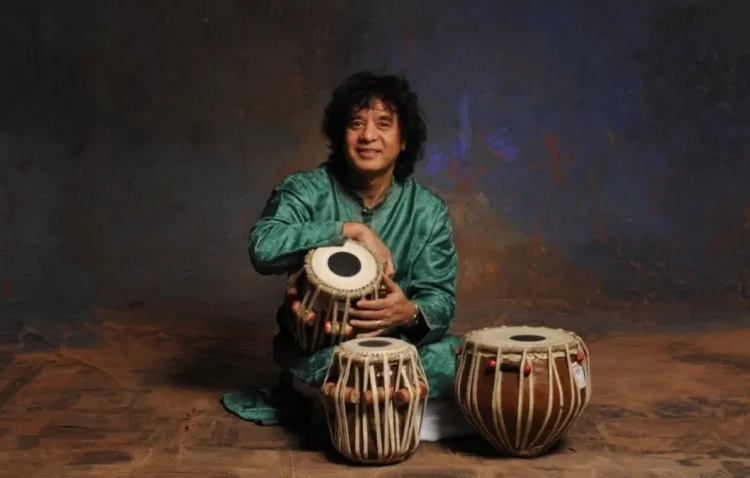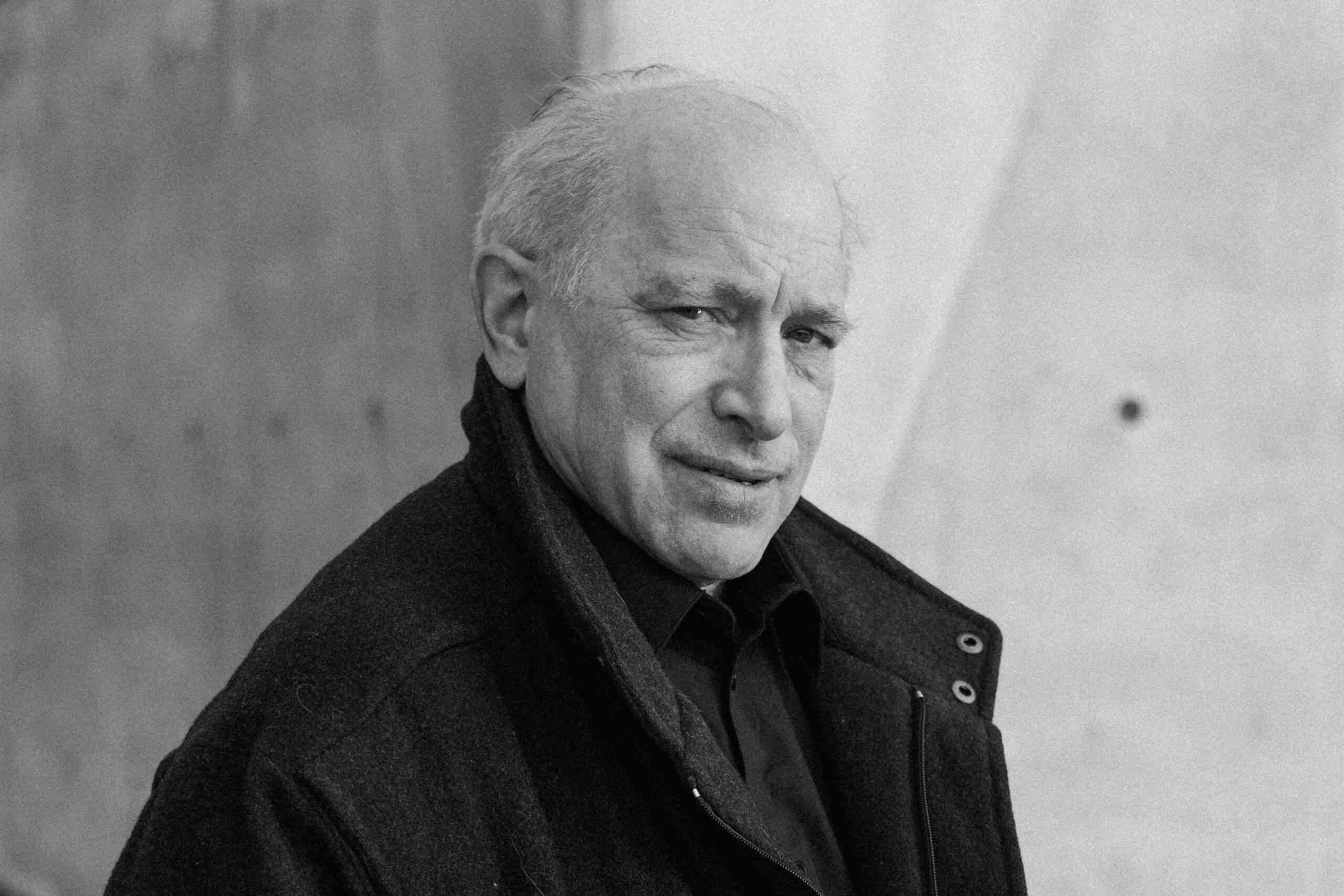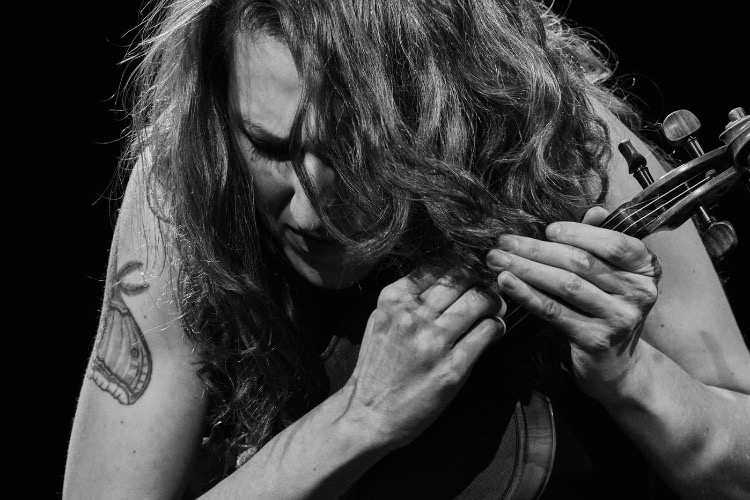Relationships Through Music: A Conversation with Zakir Hussain on Shakti at 50 (Part One)
|
Getting your Trinity Audio player ready...
|
In the summer of 1970, a guitarist continually seeking new sounds visited the House of Musical Traditions, a musical instrument store in Greenwich Village with a significant collection from around the globe. He was particularly fascinated by Indian instruments. The twenty-eight-year-old John McLaughlin requested of the proprietor that if a great Indian musician ever entered the store, to try to set up a lesson for him with the artist. The visiting artist’s instrument of choice was not even a consideration; McLaughlin was like a sponge, ready to soak up any Indian musical knowledge. A few weeks later, gifted tabla player Zakir Hussain found himself teaching a vocal lesson to McLaughlin. Three years later, they started a group, Shakti. Now, that band celebrates its fiftieth anniversary with an excellent new recording, This Moment (Abstract Logix, 2023), and tours around the globe.
Perhaps the shopkeep knew the two would see kindred spirits in each other. Or maybe their pairing was mere happenstance. Regardless, one would be hard-pressed to find a musician more in tune with McLaughlin than Hussain. The guitarist built his career upon a more traditional form – jazz – by incorporating newer rock elements and sounds from around the globe. Similarly, the percussionist is rooted in centuries-old music. When Hussain was only two years old, his father, the great Alla Rakha, prayed his son would carry on his legacy as a torch bearer for traditional music on the hand drum. While the younger became a master of Hindustani classical music, like the elder – who had also performed with Buddy Rich, Elvin, Jones, and Yusef Lateef – he also found himself drawn to Western music. In fact, it was George Harrison who once convinced Hussain not to abandon the tablas to become a rock drummer. Instead, he found ways to bring rock, jazz, and other forms of music to his tabla. Like McLaughlin, Hussain was untethered to genre, working with the Grateful Dead or, later, Earth Wind and Fire.
When McLaughlin decided to end the massively successful Mahavishnu Orchestra in 1973 to focus on Shakti, he encountered resistance. Many in the music industry struggled to classify their music. Those reliant on labels often dubbed the music jazz meets Indian music, but this is an oversimplification. In reality, the quartet with violinist L. Shankar and Ghatam player Vikku Vinayakram defied geographic boundaries. Even focused solely on the group’s Indian roots, it blurred boundaries. Northern Hindustani and southern Carnatic music, often kept divided by geography, were united by Shakti. While Western harmonics and improvisation-based music were significant guides, they were also far from the only influences outside the Indian subcontinent.
Over the years, Shakti changed form with solely McLaughlin and Hussain as its two central poles. A cynic may be inclined to point to a longstanding group with significant personnel changes as some artists’ futile effort to recapture lost past glory. But any such stereotype certainly does not apply to Shakti. True to the translation of its Hindustani name, the group seems to continue to seek “creative intelligence, beauty, and power” in whatever form it takes; not the prestige of its founders.
The aptly titled This Moment finds both McLaughlin and Hussain in an age where they are elder statesmen of the music surrounded by a younger group of artists. These less experienced artists grew up in the communal essence of Shakti but, like the group’s founders, do not find themselves confined by what came before. As a result, vocalist Shankar Mahadevan, violinist Ganesh Rajagopalan, and percussionist Selvaganesh Vinayakram bring new ideas that keep the group sounding fresh without sacrificing the magic of the original version of Shakti. Not to be outdone, McLaughlin himself forgoes the acoustic guitar used throughout the 1970s for a MIDI-controlled one which allows him to make his strings sound like a flute, a keyboard, or some foreign yet undeniably attractive instrument.
The result is music that seems to defy cultural or geographic bounds. “Shrini’s Dream”, dedicated to late mandolinist U. Srinivas, visits the Blues. “Bending the Rules” shifts between ambiance and South African-like rhythms while maintaining its Hindustani and Carnatic core. “Las Palmas” successfully attempts to narrow the gap between flamenco and Indian music, with occasional hues of Celtic influence. This Moment is an excellent record, but it implies something more than solely a good album. The music suggests that Shakti is not just about certain roots or ideas. It may even be larger than particular musicians. While McLaughlin and Hussain are the two main sails of its ship, it seems Shakti is a broader force of conversational beauty, intelligence, and creativity that will continue for generations.
We sat down with Maestro Hussain to discuss Shakti and a few of his other projects which build on the importance of longstanding relationships.
Zakir Hussain: You are located in Austin, Texas?
PostGenre: Yes. Looking forward to Shakti’s performance here in September.
ZH: I actually have a pretty deep connection to Austin because my daughter married a Texan. I have family spread between Austin and San Antonio and I have a deep connection to Austin through them. Not to mention my connection with the promoters there who are putting on the show ’cause they’ve done so many of my shows in Austin.
PG: While you have come to Austin several times, I’ve seen you perform only at the Newport Jazz Festival with Charles Lloyd’s trio.
ZH: Ah, yes. That is such a beautiful place and a great festival. I always love to go there and enjoy the weather and the ocean. It is pretty interesting because salt air is very bad for my instrument. I grew up in Bombay, which is right on the sea, and the salt air there just kills the skins on my tablas.
PG: So, with Fort Adams being out in the middle of Narragansett Bay, your heads have been destroyed at Newport as well?
ZH: No. That’s what’s interesting. For some reason, at Newport, my instrument survives. Maybe it’s because, at Newport, you play only an hour-long set. In India, you often play three-and-a-half or four-hour concerts. The heads die a third of the way through the performance, and you gotta switch drums. But you wanted to discuss Shakti?
PG: Right, but before that, some of the performances on Shakti’s US tour have Béla Fleck as their opening act. You recorded with Fleck and Edgar Meyer several years ago (The Melody of Rhythm (Koch, 2009)) and released a new trio album this year as well [As We Speak (Béla Fleck Productions, 2023)]. How did that trio come together?
ZH: Oh my god. About fourteen or fifteen years ago, Béla and Edgar were asked by the Nashville Symphony Orchestra to compose a new piece to premiere in a newly constructed concert hall on its opening day. They had already done a piece or two with the orchestra before and decided to try something a little different. They sought me out as a third wheel in the tricycle to help compose the piece. Béla and Edgar both knew of me because they were both die-hard fans of Shakti, and they listened to the group a lot when they hung out together. They told me they found inspiration in Shakti to do things musically that were different from what they grew up with, and that was why they wanted to connect with me.
So, the three of us came together and composed the piece. When we came together, it was like family. Everybody was so comfortable being with each other. It felt perfect. It kind of felt the same as it did the first time I met John McLaughlin. And, so we kept writing music as a trio, which became part of the first record, along with the piece we wrote for the symphony orchestra. Over the years, our families have become close too.
PG: It seems relationships are very important to you.
ZH: Building on relationships is the only way to make good music. You must know each other’s likes and dislikes. And those kinds of things inevitably find their way into your interactions with each other in not just your conversations off stage, but also your musical conversations on the stage.
That’s certainly how it has worked with John [McLaughlin] and me. Now, we are fifty years down the road and can look at each other and know what the other is thinking. You start to play a riff, and the other guy already knows where to go with it. That interaction becomes part of our DNA and allows us to walk the path together without needing to use a GPS.
PG: You have worked with John on so many projects over the years. Do you feel your connection with him continues to get deeper as time passes?
ZH: Yes, it does. I’m definitely a fan of working with a musician over many decades. That’s exactly what we do in India. There are some musicians I have worked with for forty or fifty years. After about fifteen or twenty years into the relationship, you start to enter an interesting comfort zone with some give and take that only comes from knowing each other in depth. That comfort zone also brings, when you get together, not only your past times together but also the experiences you’ve had away from each other.
That addition adds another layer of conversation that allows us to inject and include what each of us experienced away and make that part of our little experience together. So, every time we meet, it’s not [merely] the same orbit as before. It’s also an expansion of the orbit that makes the experience interesting.
PG: It would seem that Shakti’s evolving group of musicians would also add different elements to these conversations.
ZH: Over the years, the many different editions and incarnations of the group Shakti have allowed us to experience our relationship differently. The changes have allowed us to experience the group through the eyes of other musicians who joined us and their ears, which told us what we were doing from their perspective. The different incarnations have allowed us to see little nooks and corners in our world that we may have overlooked. Revisiting, reorganizing, and repolishing Shakti, as we have done, has made the group a little bit more pristine, more chiseled, and more sharp and shapely. But that comes only from ongoing relationships. If you play together only once or twice, and then don’t see each other again, you haven’t given a chance for that particular magic to evolve and turn into something wondrous and sublime.
PG: In another interview, you were asked why people still remember Shakti after fifty years. You answered that its band members, across its different versions, have come together to produce one sound. Has it been more difficult with the newest version to find that one sound, as there are now also generational differences among the musicians?
ZH: No. It’s actually easier than before because the people who’ve come on board have grown up with the idea of Shakti and the experience and energy of Shakti. That is true whether it is Shankar Mahadevan, Selvaganesh [Vinayakram], or Ganesh Rajagopalan. They were all, like Béla and Edgar, big Shakti fans.
There is a proxy of sorts where, when you grow up listening to a particular music, you play with all the musicians you listened to when you make music. For me, that means I play with the many Indian musicians I grew up listening to. Since Shankar, Yushri, Selvaganesh, and Ganesh grew up listening to Shakti, they played with us by proxy long before joining us. So, it was natural when they finally did. Same with [Uppalapu] Srinivas, the great mandolin maestro who was in Remember Shakti, but had since passed away. But it takes many, many moons before John and I finally are like, “Hey, let’s bring this person in because it feels right.”
PG: In the case of Selvaganesh Vinayakram, that connection must have felt pretty immediate, given his father, Vikku Vinayakram, played [ghatam, an earthen pot] in the original version of Shakti.
ZH: Yes. When Vikku wanted to step back and concentrate on his school in South India, it was a natural fit for his son, Selvaganesh, to take over. Selvaganesh grew up with us and was practicing with Shakti records when he was a young – seven or eight-year-old – kid. He also watched us up close. When he finally played with us, Selvaganesh did not miss a beat. It was like jumping onto a moving train without any problem, and there you are.
We are fortunate. When Vikku decided to leave, it was like, “Oh my God, what’s going to happen?” For a brief while, we even considered having only me for percussion. We may have even played one or two concerts that way. But it just didn’t feel right. It was just not the same. Selva coming in really helped to balance the way forward.
I’m very grateful to Vikku for allowing his young son to join us. Because Vikku is such a traditionalist, I wondered if he wanted his son to stay in India, playing traditional music and establishing himself that way, and then do something else like Vikku himself had done. But no, he felt comfortable with Selva going out with us. It has really helped Shakti blossom in ways that made sense as a continuation of the band.
It was the same when [vocalist] Shankar Mahadevan joined us. Shankar and I had worked together for eighteen years. He was singing for me when I was composing for films in India and other projects. We would also sit around and practice Shakti music, so when he ultimately came to our first rehearsal, he knew our whole repertoire, with no issues. And he was able to inject in spaces some stuff that brought his personality out as well and to do so in a very copacetic manner. It just worked perfectly. And it was the same way when Srinivas joined Remember Shakti. With him, it was almost like John McLaughlin playing mandolin.
Fortunately for John and me, as we have added people to Shakti, it has always been an extension of the same joyous energy that we started with way back when just continued onwards with an interesting new sonic layer added. The group was still the same joyous energy and a new person coming in did not, in any way, disrupt the chain of events. It just added to it and helped in the smooth flow of it. We are fortunate that we have been able to bring on board the right people who were the perfect fit.
PG: As far as Selvaganesh specifically and the fact his father was in Shakti, do you see a parallel between that and how you took over for your father with Ravi Shankar?
ZH: Well, yeah. There were times when I took over from my dad and played with Ravi Shankar when I was in my teens and later on too. I guess what was interesting was that I was able to essentially emulate or plagiarize my dad when I was working with the maestro. And it was good. It was a place to start and be comfortable with. But playing with the maestro was an interesting lesson because in the process of our discussion – our on-stage musical conversation when there was something that slipped out from me that was in addition to my dad’s routine, the maestro would look at me and would smile. There would be a recognition of, “Ah, there you go, that’s good.” In some ways without saying anything, the maestro was pointing out to me that, yes, keep going and bring some of that over.
It is the same thing when Selvaganesh plays with us. I play with him while he’s sitting across the stage from me. Rarely do we take our eyes away from each other when we play. It’s not like two drummers as you would see in a group like the Grateful Dead where Mickey [Hart] and Bill Kreutzmann sit next to each other but look out at the audience. When Selvaganesh and I sit on the stage, we sit across from each other, looking at one another, not the audience. That is such an interesting connection because our eyes widening or squinting gives us a view of what might come. Because so much of our music is improvised on the spot, spontaneity is an important element. If I’m gonna go somewhere, Selva knows where that is and will tag along, while bringing in some of his contemporary stuff to add to the excitement of us working together in tandem. We rarely look at John, Shankar, or Ganesh. Now and then we do, but we are mainly just locked eye to eye. And it just works beautifully.
Click Here for the Second Half of our Conversation with Hussain, Where We Go Deeper into This Moment.
This Moment is now available on Abstract Logix. It can be purchased on Bandcamp. Shakti will be touring Europe through June and July, 2023 and the United States in August and September, 2023. More on the tour can be found here. Read more on Hussain on his website.




2 thoughts on “Relationships Through Music: A Conversation with Zakir Hussain on Shakti at 50 (Part One)”